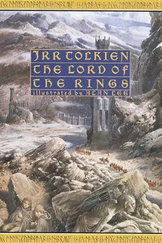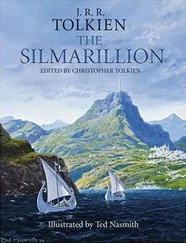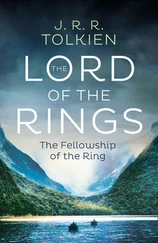But Feanor laughed, and spoke not to the herald, but to the Noldor, saying: 'So! Then will this valiant people send forth the heir of their King alone into banishment with his sons only, and return to their bondage? But if any will come with me, I say to them: Is sorrow foreboded to you? But in Aman we have seen it. In Aman we have come through bliss to woe. The other now we will try: through sorrow to find joy; or freedom, at the least.'
Then turning to the herald he cried: 'Say this to Manwe Sulimo, High King of Arda: if Feanor cannot overthrow Morgoth, at least he delays not to assail him, and sits not idle in grief. And it may be that Eru has set in me a fire greater than thou knowest. Such hurt at the least will I do to the Foe of the Valar that even the mighty in the Ring of Doom shall wonder to hear it. Yea, in the end they shall follow me. Farewell!'
In that hour the voice of Feanor grew so great and so potent that even the herald of the Valar bowed before him as one full-answered, and departed; and the Noldor were over-ruled. Therefore they continued their march; and the House of Feanor hastened before them along the coasts of Elende: not once did they turn their eyes back to Tirion on the green hill of Tuna. Slower and less eagerly came the host of Fingolfin after them. Of those Fingon was the foremost; but at the rear went Finarfin and Finrod, and many of the noblest and wisest of the Noldor; and often they looked behind them to see their fair city, until the lamp of the Mindon Eldalieva was lost in the night. More than any others of the Exiles they carried thence memories of the bliss they had forsaken, and some even of the things that they had made there they took with them: a solace and a burden on the road.
Now Feanor led the Noldor northward, because his first purpose was to follow Morgoth. Moreover Tuna beneath Taniquetil was set nigh to the girdle of Arda, and there the Great Sea was immeasurably wide, whereas ever northward the sundering seas grew narrower, as the wasteland of Araman and the coasts of Middle-earth drew together.
But as the mind of Feanor cooled and took counsel he perceived overlate that all these great companies would never overcome the long leagues to the north, nor cross the seas at the last, save with the aid of ships; yet it would need long time and toil to build so great a fleet, even were there any among the Noldor skilled in that craft. He resolved now therefore to persuade the Teleri, ever friends to the Noldor, to join with them; and in his rebellion he thought that thus the bliss of Valinor might be further diminished and his power for war upon Morgoth be increased. He hastened then to Alqualonde, and spoke to the Teleri as he had spoken before in Tirion.
But the Teleri were unmoved by aught that he could say. They were grieved indeed at the going of their kinsfolk and long friends, but would rather dissuade them than aid them; and no ship would they lend, nor help in the building, against the will of the Valar. As for themselves, they desired now no other home but the strands of Eldamar, and no other lord than Olwe, prince of Alqualonde. And he had never lent ear to Morgoth, nor welcomed him to his land, and he trusted still that Ulmo and the other great among the Valar would redress the hurts of Morgoth, and that the night would pass yet to a new dawn. Then Feanor grew wrathful, for he still feared delay; and hotly he spoke to Olwe. 'You renounce your friendship, even in the hour of our need,' he said. 'Yet you were glad indeed to receive our aid when you came at last to these shores, fainthearted loiterers, and wellnigh emptyhanded. In huts on the beaches would yon be dwelling still, had not the Noldor carved out your haven and toiled upon your walls.'
But Olwe answered: 'We renounce no friendship. But it may be the part of a friend to rebuke a friend's folly. And when the Noldor welcomed us and gave us aid, otherwise then you spoke: in the land of Aman we were to dwell for ever, as brothers whose houses stand side by side. But as for our white ships: those you gave us not. We learned not that craft from the Noldor, but from the Lords of the Sea; and the white timbers we wrought with our own hands, and the white sails were woven by our wives and our daughters. Therefore we will neither give them nor sell them for any league or friendship. For I say to you, Feanor son of Finwe, these are to us as are the gems of the Noldor: the work of our hearts, whose like we shall not make again.'
Thereupon Feanor left him, and sat in dark thought beyond the walls of Alqualonde, until his host was assembled. When he judged that his strength was enough, he went to the Haven of the Swans and began to man the ships that were anchored there and to take them away by force. But the Teleri withstood him, and cast many of the Noldor into the sea. Then swords were drawn, and a bitter fight was fought upon the ships, and about the lamplit quays and piers of the Haven, and even upon the great arch of its gate. Thrice the people of Feanor were driven back, and many were slain upon either side; but the vanguard of the Noldor were succoured by Fingon with the foremost of the host of Fingolfin, who coming up found a battle joined and their own kin falling, and rushed in before they knew rightly the cause of the quarrel; some thought indeed that the Teleri had sought to waylay the march of the Noldor at the bidding of the Valar. Thus at last the Teleri were overcome, and a great part of their mariners that dwelt in Alqualonde were wickedly slain. For the Noldor were become fierce and desperate, and the Teleri had less strength, and were armed for the most part but with slender bows. Then the Noldor drew away their white ships and manned their oars as best they might, and rowed them north along the coast. And Olwe called upon Osse, but he came not, for it was not permitted by the Valar that the fight of the Noldor should be hindered by force. But Uinen wept for the mariners of the Teleri; and the sea rose in wrath against the slayers, so that many of the ships were wrecked and those in them drowned. Of the enslaving at Alqualonde more is told in that lament which is named Noldolante, the Fall of the Noldor, that Maglor made ere he was lost.
Nonetheless the greater part of the Noldor escaped, and when the storm was past they held on their course, some by ship and some by land; but the way was long and ever more evil as they went forward. After they had marched for a great while in the unmeasured night, they came at length to the northern confines of the Guarded Realm, upon the borders of the empty waste of Araman which were mountainous and cold. There they beheld suddenly a dark figure standing high upon a rock that looked down upon the shore. Some say that it was Mandos himself, and no lesser herald of Manwe. And they heard a loud voice, solemn and terrible, that bade them stand and give ear. Then all halted and stood still, and from end to end of the hosts of the Noldor the voice was heard speaking the curse and prophecy which is called the Prophecy of the North, and the Doom of the Noldor. Much it foretold in dark words, which the Noldor understood not until the woes indeed after befell them; but all heard the curse that was uttered upon those that would not stay nor seek the doom and pardon of the Valar.
'Tears unnumbered ye shall shed; and the Valar will fence Valinor against you, and shut you out, so that not even the echo of your lamentation shall pass over the mountains. On the House of Feanor the wrath of the Valar lieth from the West unto the uttermost East, and upon all that will follow them it shall be laid also. Their Oath shall drive them, and yet betray them, and ever snatch away the very treasures that they have sworn to pursue. To evil end shall all things turn that they begin well; and by treason of kin unto kin, and the fear of treason, shall this come to pass. The Dispossessed shall they be for ever.
Читать дальше












